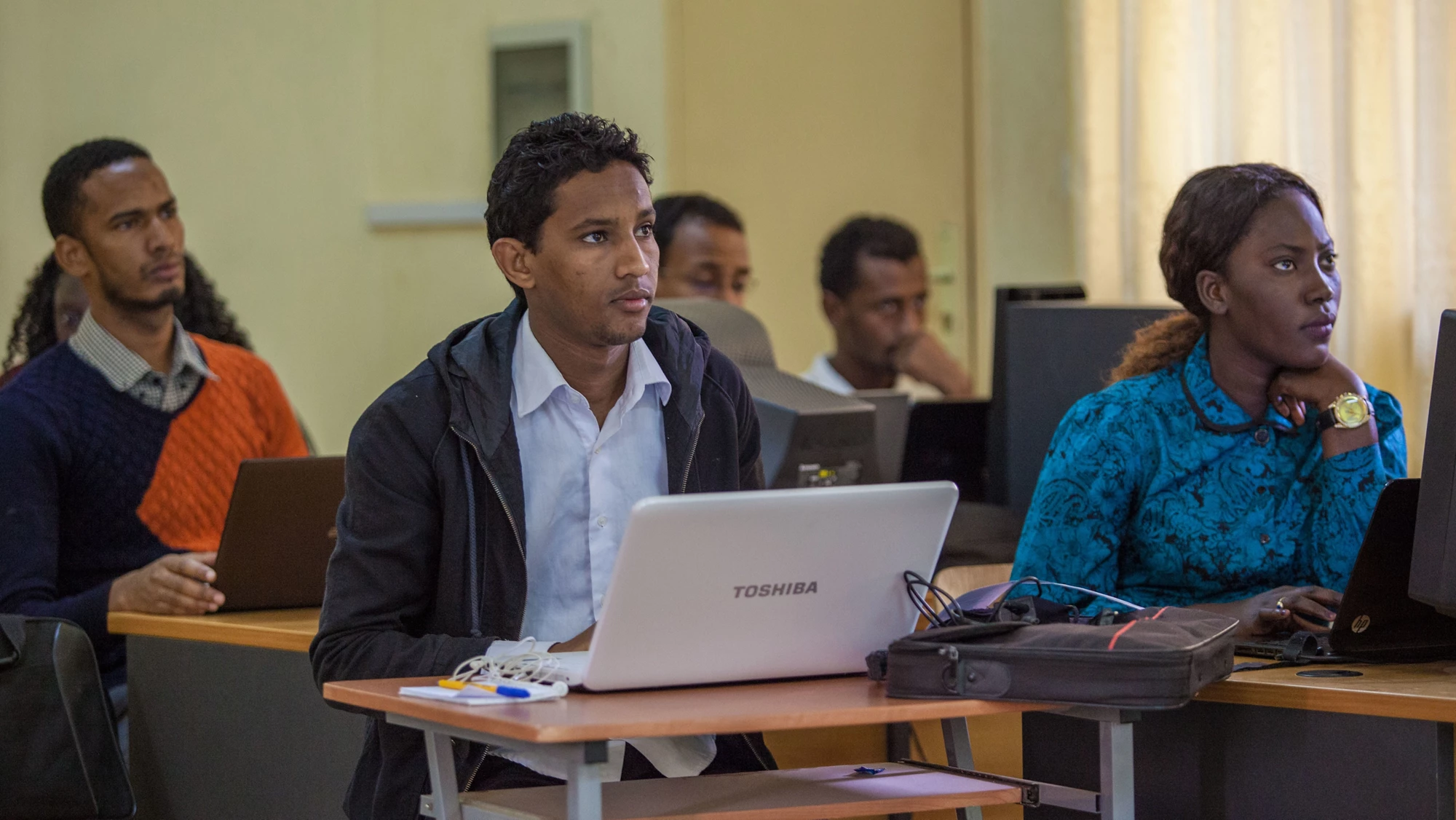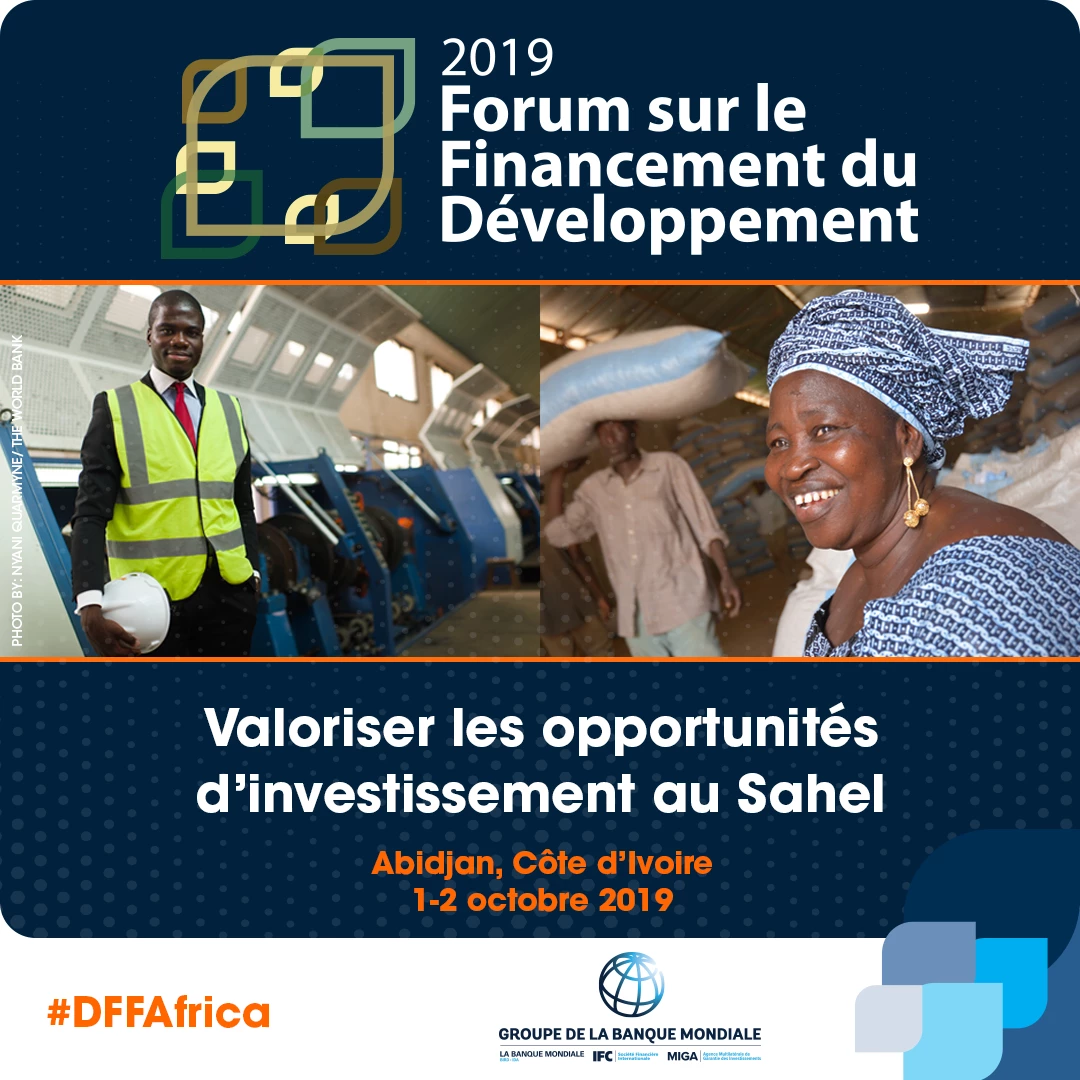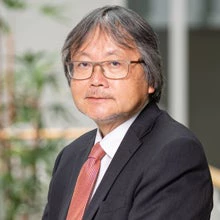 セネガルのサンルイ市にあるガストン・ベルジェ大学(UGB)にて、コンピューターサイエンス修士課程で学ぶ大学院生。写真: © Sarah Farhat/ 世界銀行
セネガルのサンルイ市にあるガストン・ベルジェ大学(UGB)にて、コンピューターサイエンス修士課程で学ぶ大学院生。写真: © Sarah Farhat/ 世界銀行
Economic growth has the power to transform societies, boost prosperity, and enable citizens to thrive. But for that economic growth to benefit the poorest members of society, it must be accompanied by more and better jobs, one of main routes out of poverty. That is why job creation remains a top development priority—and a critical challenge.
As I prepare to head to Abidjan, Côte d’Ivoire, for the 2019 Development Finance Forum, it is useful to remember that the private sector is a key player in development. A vibrant private sector is a powerful driver of jobs and can underpin sustainable economic growth, fueling innovation and poverty reduction.
The International Development Association (IDA), the arm of the World Bank that provides development financing to the world’s poorest countries, has been at the forefront in helping countries transform their economies and create productive jobs by supporting investments to build essential infrastructure, providing access to loans and credit, helping workers develop skills, and facilitating greater access to markets for citizens and businesses.
IDA is delivering historic support in Africa. Over the last two fiscal years, IDA has committed more than $45 billion in development lending worldwide, of which nearly $30 billion went to Africa. And IDA is on track to deliver $45 billion to Africa by the end of the three-year IDA18 cycle, which concludes in June 2020. For countries in the Sahel, IDA commitments reached $3.7 billion in the first two years of IDA18, more than double compared to the same period of IDA17 ($1.8 billion).
This year marks the fifth annual Development Finance Forum, which is convened by the World Bank Group to bring together the public and private sectors, multilateral institutions, and other regional stakeholders, to identify opportunities and address constraints for changing the investment landscape in the least developed countries. Through interactive discussions, participants will gain a clearer understanding of each other’s roles, and explore promising ideas, initiatives, and partnerships.
The 2019 Forum is in line with the Compact with Africa initiative, and will focus on countries in West Africa and the Sahel, with particular emphasis on three sectors with significant growth and job creation potential: agribusiness, transport and logistics, and digital infrastructure.
In West Africa agriculture is a pivotal sector, accounting for 35 percent of the region’s GDP and 60 percent of the active labor force. West African value chains, however, significantly lag those in other parts of Africa. Governments and the private sector need to collaborate in connecting farmers and food producers to better market opportunities, creating vibrant and competitive agricultural value chains—including production, processing, and distribution—which are key pathways to creating jobs and improving incomes.
Access to transport is critical for Africa’s social and economic transformation. About 450 million Africans—more than 70 percent of the total rural population—are unconnected due to lack of transport infrastructure and systems. Between 24 to 58 percent of firms across major cities in West Africa and the Sahel say transport is a severe obstacle to their business. Improved urban and regional connectivity and enhanced access to efficient, climate-friendly, and safe transport services would create opportunities for people to access education, jobs, and services and for firms to access markets.
Sub-Saharan Africa is also home to the world’s youngest population and is ready for a digital transformation that could change the trajectory of the continent. A rapid transition to the digital economy can boost productivity, delivering jobs for an increasingly technology savvy population. For example, the continent has the highest percentage of people using mobile money, breaking traditional barriers to financial inclusion and creating opportunities for entrepreneurship. However, countries in West Africa and the Sahel lag in digital infrastructure. This is why investments like the World Bank Group’s commitment to the Digital Economy for Africa initiative, which is working to ensure that every woman, man, business, and government is digitally enabled by 2030, are important.
The World Bank Group is actively supporting IDA countries in Africa in these critical areas. In Côte d’Ivoire, a new World Bank-funded e-agriculture project will increase access to digital services and leverage digital platforms to improve farm productivity and access to markets. The project will benefit 6.1 million smallholder farmers, representing around a quarter of the country’s 23.7 million people.
In West Africa, we have helped connect six countries to the African Coast to Europe (ACE) submarine fiber optic cable through the West Africa Regional Communications Infrastructure Program. As a result, the price of internet access has dropped dramatically—by more than half in most cases—allowing more schools, households, and SMEs to connect to better quality Internet. In the Gambia, for instance, the wholesale price for internet access is less than a fifth of what it used to be.
And the World Bank Group’s investment in the Tema Port in Ghana through the International Finance Corporation (IFC) —the arm of the World Bank Group that focuses on the private sector—is supporting the construction and operation of a new deep-water container terminal. The project is expected to boost trade for Ghana’s economy, and support the creation of new jobs in the private sector. Given its strategic location in relation to Accra, the Tema Port will handle over 90 percent of Ghana’s container traffic and will also serve as an outlet for neighbors in the Sahel, including Burkina Faso, Niger, Mali.
The Development Finance Forum offers a chance to bring together expertise from across the private and public sectors and work together to transform the economies of countries in the Sahel, West Africa, and beyond. IDA and the entire World Bank Group are committed to working with our partners in the region to help ensure that Africa has the ability to mobilize private investment, create quality jobs, and realize better development outcomes for people where they live.




Join the Conversation